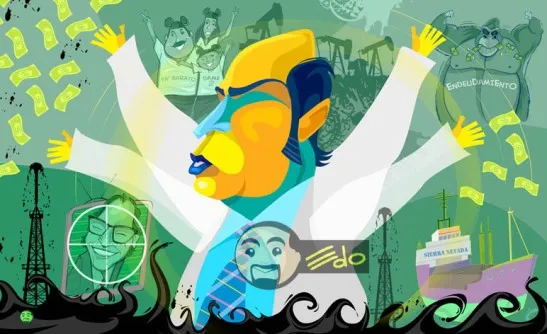This is my entry to @galenkp’s Weekend Engagement #159. I picked the fifth topic:
If you could live in the 50s, 60s or 70s (at your current age), which would it be and why?
If Only I Had Enjoyed the Saudi Venezuela
Venezuela, like any other country has had its ups and downs. Civil wars followed its independence War and for about a century it remained a jungle nation ruled by military caudillos. Democratic elections started in 1948, but lasted just a few months. By 1952 another dictator was in office. It wasn’t until 1959 that the country started to experience democratic stability, even though there remained some guerrilla fighting until the early 70 (my father, who was a national guard was in the mountains fighting the guerrillas when I was born). The 70s was probably the most stable, prosperous and culturally stimulating decade to be alive in Venezuela.
I was born in 1973 in a rural town, away from all the cosmopolitan boom and urban developments, but even in a small town in the province the 70s felt peaceful and promising. There were important urban development during the 1950s, but the fact that they happened during Marcos Perez Jiménez’ dictatorship prevented those advances to be appreciated by the average citizen and the rest of the world. The 60s gave Venezuela a little bit of exposure and the stability allowed foreign companies to start investing in all areas (communication, food, clothing, technology, science, health, etc.), although those investment were usually made with share advantages for the foreign investors.
Venezuelan president Carlos Andrés Pérez (74-79) nationalized the iron industry in 1975 and the oil industry in 76. Conflicts in the Middle East had caused a significant increase in the price of oil and we were producing about three million barrels a day. That meant that most of the revenues from our main export sources went to the national treasury instead of being split by foreign companies. Venezuela’s spending capacity boomed. Venezuela became the richest nation in South America and one of the richest countries in the world. Venezuelans went on a consumerist spree that caused cues in every port. Caracas had more French restaurants than New York, they said and Venezuelans consumed more whiskey than Scotland. Professionals were able to travel to any country they wanted on vacations, although Miami, Florida became their favorite destination. The expression, “it’s cheap; give me two” became popular at the time and summarized Venezuelan customers attitude in American markets.
They called those years “la Venezuela saudita.” However, corruption ran rampant and except for the big cities, little was done to help small towns develop. By the time I was 10 years old, the bonanza was over. I did not have a chance to enjoy that party, so, if I could go back in time with my current age and professional experience, I’d love to be back in the 70s when professionals were so well paid, people from all over the world chose Venezuela to work. Many of them made Venezuela their home and contributed to the academic development of our universities.
The old professors I met when I started college, who enjoyed the Saudi years, were able to guarantee financial and social stability to their families. They sent their children to college, in many cases to other countries; they owned properties that they could leave their children and whose value was constantly increasing in the market; they had social security and could enjoy a decent and comfortable retirement.
My generation has had a harder time. The 2010s and 2020s will be registered in history as red decades. We keep working on making things better for our families, but it is unavoidable to feel nostalgic for the better past, even if that bonanza had the germ of our current economic and political tragedy.
Thanks for stopping by



